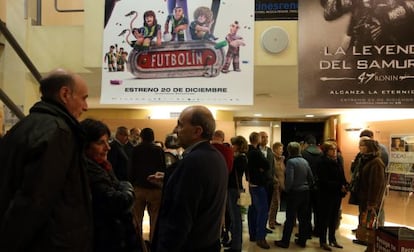Residents to the rescue
Local film fans are clubbing together to reopen Spain’s movie theaters

There are many ways of dreaming while you’re awake. One is to go to the movies. Another is to open a movie theater. Despite the continuous trickle of cinema closures, the 13-percent value-added tax hike on tickets, rampant piracy and changes to the industry model enforced by the internet, many have opted for this dream, and have dug into their own pockets to reopen the doors of one of the many movie theaters to have closed in Spain in recent months.
Two weeks ago, a group of 1,000 people reopened the Multicines Majadahonda, which is the oldest multiplex in Madrid, and is situated on the outskirts of the city. Having opened in 1979, for many years it was a branch of the Renoir chain, until its four small screens became part of the 200 that the owner of Alta Films S. A., and head of the Spanish Film Academy, Enrique González Macho, was forced to close last spring.
But some of the theater’s 70,000 customers were not prepared to simply accept such a loss and got to work, with teacher Delia Mateos and economist Gabriel Rodríguez at the helm. “We have signed a rental contract with Alta Films guaranteed by a viable plan and some conservative projections,” explained its organizers at one of the most recent board meetings. “We have turned the customers into the owners. [...] The idea is to create a non-profit, participatory and intimate cinema, making filmgoers an active part of it, by helping to define its direction, transforming attendance at this theater into a fun, cultural and social act — and with lower ticket prices.”
The packed opening on Tuesday December 17, which featured a screening of Living Is Easy with Eyes Closed and a chat with its director David Trueba, confirmed the acceptance and support of a project that, more than a dream, is now a reality. This week customers of the newly named Cines Zoco will be able to see movies such as Cannes Palme d’Or winner Blue Is the Warmest Color, the Coen brothers’ latest Inside Llewyn Davis and animation Foosball for between 3.50 and 7.50 euros, depending on the day of the week and whether they are members.
This is not the first theater to be rescued by residents, nor is it likely to be the last
The Zoco is not the first movie theater to be rescued by local residents, nor is it likely to be the last, given that just over a month ago the state association Cinema Autor was set up to encourage this kind of initiative across the country. The model for the Zoco is based on one Pedro Barbadillo created in Palma de Mallorca over a year ago. As he explains: “It is made up of a non-profit cultural association, Xarxa Cinema, which negotiates the transfer of the premises, and the members commit to paying an annual fee of 100 euros, which gives them the right to go to the theater for free a certain number of times and actively take part in the management of the project. The activities are organized by committees — programming, film archive, activities, education, publicity, events — and are open to everyone who wants to participate.”
The Federation of Spanish Cinemas (FECE) has congratulated the organizers on the reopening, which is also good news for distributors. “It allows us to stretch out the run of our films on the circuit and keep them longer on the program so they are more profitable,” says a spokesman for distributor Vértigo.
Meanwhile, the trend continues. The closed Renoir cinema in Zaragoza is planning to reopen on similar terms and in Barcelona the Zumzeig “bistro cinema” has just opened its doors.
Tu suscripción se está usando en otro dispositivo
¿Quieres añadir otro usuario a tu suscripción?
Si continúas leyendo en este dispositivo, no se podrá leer en el otro.
FlechaTu suscripción se está usando en otro dispositivo y solo puedes acceder a EL PAÍS desde un dispositivo a la vez.
Si quieres compartir tu cuenta, cambia tu suscripción a la modalidad Premium, así podrás añadir otro usuario. Cada uno accederá con su propia cuenta de email, lo que os permitirá personalizar vuestra experiencia en EL PAÍS.
¿Tienes una suscripción de empresa? Accede aquí para contratar más cuentas.
En el caso de no saber quién está usando tu cuenta, te recomendamos cambiar tu contraseña aquí.
Si decides continuar compartiendo tu cuenta, este mensaje se mostrará en tu dispositivo y en el de la otra persona que está usando tu cuenta de forma indefinida, afectando a tu experiencia de lectura. Puedes consultar aquí los términos y condiciones de la suscripción digital.








































